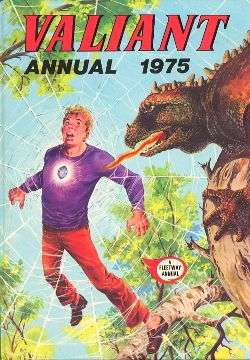Valiant (comics)
| Valiant | |
|---|---|
|
The cover of the Valiant annual of 1975. | |
| Publication information | |
| Publisher | IPC Magazines |
| Schedule | Weekly |
| Format | Ongoing series |
| Genre | |
| Publication date | April 1962 – October 1976 |
| Number of issues | 730 |
| Creative team | |
| Writer(s) |
Scott Goodall Tom Tully |
| Artist(s) |
Jesús Blasco Eric Bradbury |
Valiant was a British boys adventure comics anthology which ran from 1962 to 1976. It was published by IPC Magazines and was one of their major adventure titles throughout the 1960s and early 1970s.
Publication history
The title went through a number of name changes and mergers, although always returning to its simpler one-word name. On 23 February 1963, it merged with Knockout, and later, with Smash! in 1971. It was briefly published for one week as "Valiant" again on 25 September 1971, then Valiant and TV21 on 2 October 1971. It merged with Lion on 25 May 1974, and with Vulcan on 10 April 1976.
After many years, Valiant began to seem old-fashioned when the first of a new type of comic was launched, the first issue of Battle Picture Weekly, in 1975. It suffered further when Pat Mills launched Action in February 1976. Attempts by John Wagner to update the title were initially successful, but it struggled to find a place in the market against these tougher adventure titles. Valiant limped on for a few months, but finally merged with Battle Picture Weekly in October 1976.
In June 1963, Valiant brought out the first two (per month) issues of the digest sized "Valiant Picture Library" which featured stories which were nothing to do with the comic. They cost one shilling (5p) each.
On 19 March 2012, the Royal Mail launched a special stamp collection to celebrate Britain's rich comic book history.[1] The collection featured Valiant, The Beano, The Dandy, Eagle, The Topper, Roy of the Rovers, Bunty, Buster, Twinkle and 2000 AD.
Stories
Valiant contained a mix of conventional war stories, such as Captain Hurricane, which was a humorous strip set in World War II about a massive ex-sea skipper who became a Captain in the Royal Marines, and who could be provoked into "ragin' fury" berserker rages which gave him great strength; classic humour strips, such as Billy Bunter; and classic detective strips, such as Sexton Blake.
But it also had a number of innovative new heroes. In Kelly's Eye, for instance, Tim Kelly wore a jewel called the Eye of Zoltec (obtained from a Mayan idol) around his neck, which protected him from all harm, making him invulnerable. Adam Eterno (who originally appeared in Thunder) was thousands of years old, and could only be slain by a fatal blow from a weapon made of gold. The House of Dolmann featured an inventor who constructed remote controlled "dolls", or puppets, with strange abilities, such as stretching, drilling, and vision powers, that helped him in his fight against crime. Jack o'Justice, always accompanied by his girlfriend and eventual wife Moll Moonlight, was a swashbuckling 18th century adventurer who was essentially another crimefighter; both Jack and Moll were experts with their swords and on horseback. In time, the Jack o'Justice stories ended and the series was replaced by Jack Justice, a contemporary crimefighting adventurer who was the direct descendant of Jack and Moll.
The celebrated anti-hero, The Steel Claw, with his fantastic power of invisibility and the capability to electrocute his enemies, due to his body's ability to store electric current, would influence comic creators such as Alan Moore and David Lloyd. Mytek the Mighty, a giant robot ape, started out as a villain in the hands of a criminal, but eventually became a hero who battled other robots and giant creatures.
As well, a two-page text story titled Jason Hyde also appeared, about a character from whose eyes poured blue rays (he normally wore dark sunglasses) that allowed him to see through solid objects and read minds. He had many strange adventures: including deep inside the Earth; in another dimension; fighting giant spiders; and fighting a man with incredible powers.
The stories were well written, being mainly 2 or 3 pages long, and in black and white (apart from the coloured covers). Many of them continued week after week, with cliff-hanger endings.
Character re-appearances
Several of Valiant's characters have made appearances since the comic's cancellation. Alan Moore and Alan Davis used several (renamed) characters in their Captain Britain strip. Also, Quality Comics released a four issue mini-series of The Steel Claw in 1986, featuring recoloured reprint material, with new material drawn by Garry Leach that acted as a framing device. The Steel Claw and several of IPC's 1960s heroes were also featured in Zenith in 2000 AD, followed by a one-off special featuring old Valiant and IPC characters.
In 2005 many of IPC's characters were featured in a mini-series called Albion, published by the Wildstorm imprint of DC Comics, written by Leah Moore and John Reppion and plotted by Alan Moore.
Notes
- ↑ "Beano's Dennis the Menace on Royal Mail comic stamps". BBC News. 19 March 2012. Retrieved 2012-03-19.
References
External links
- Valiant at 26pigs.com, a site for British comics
